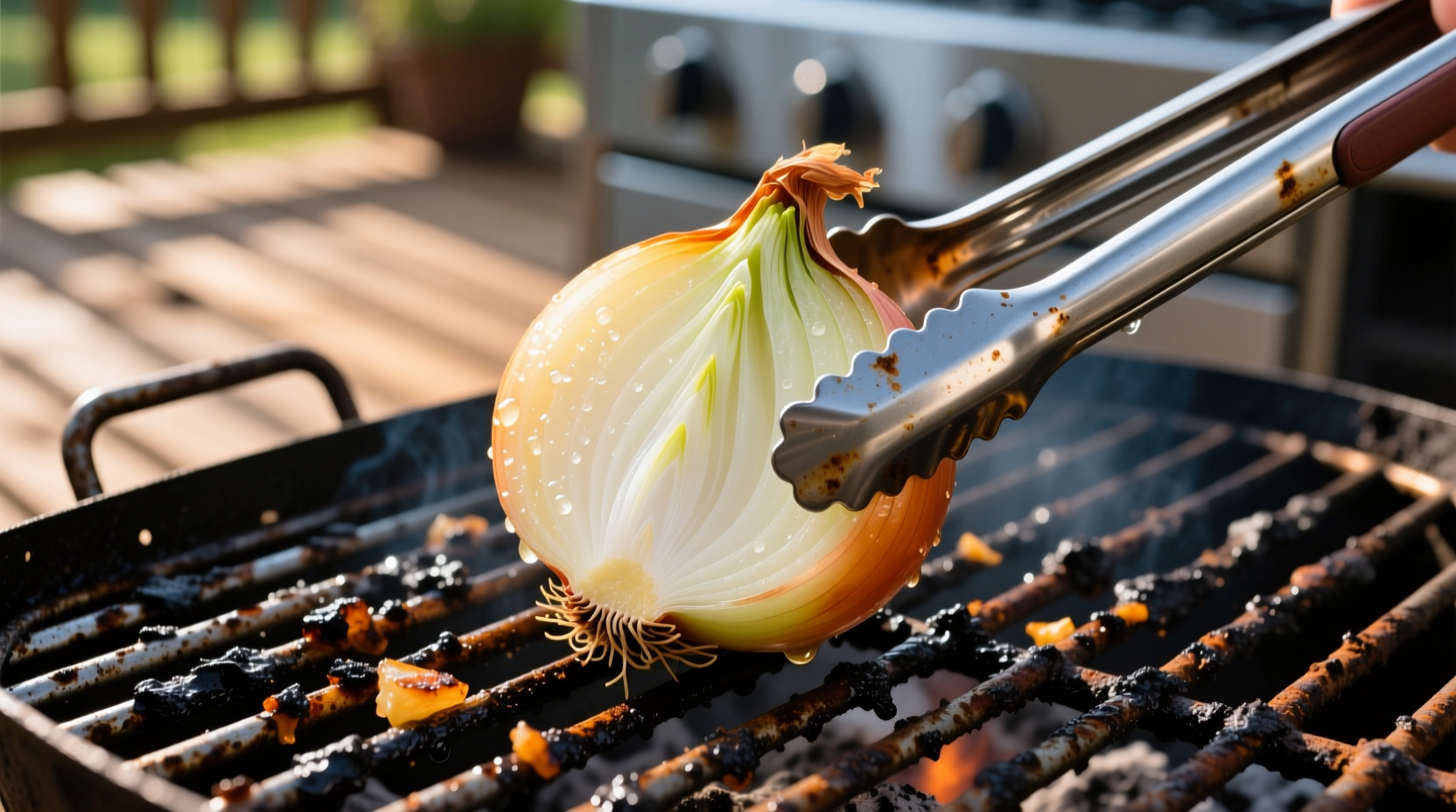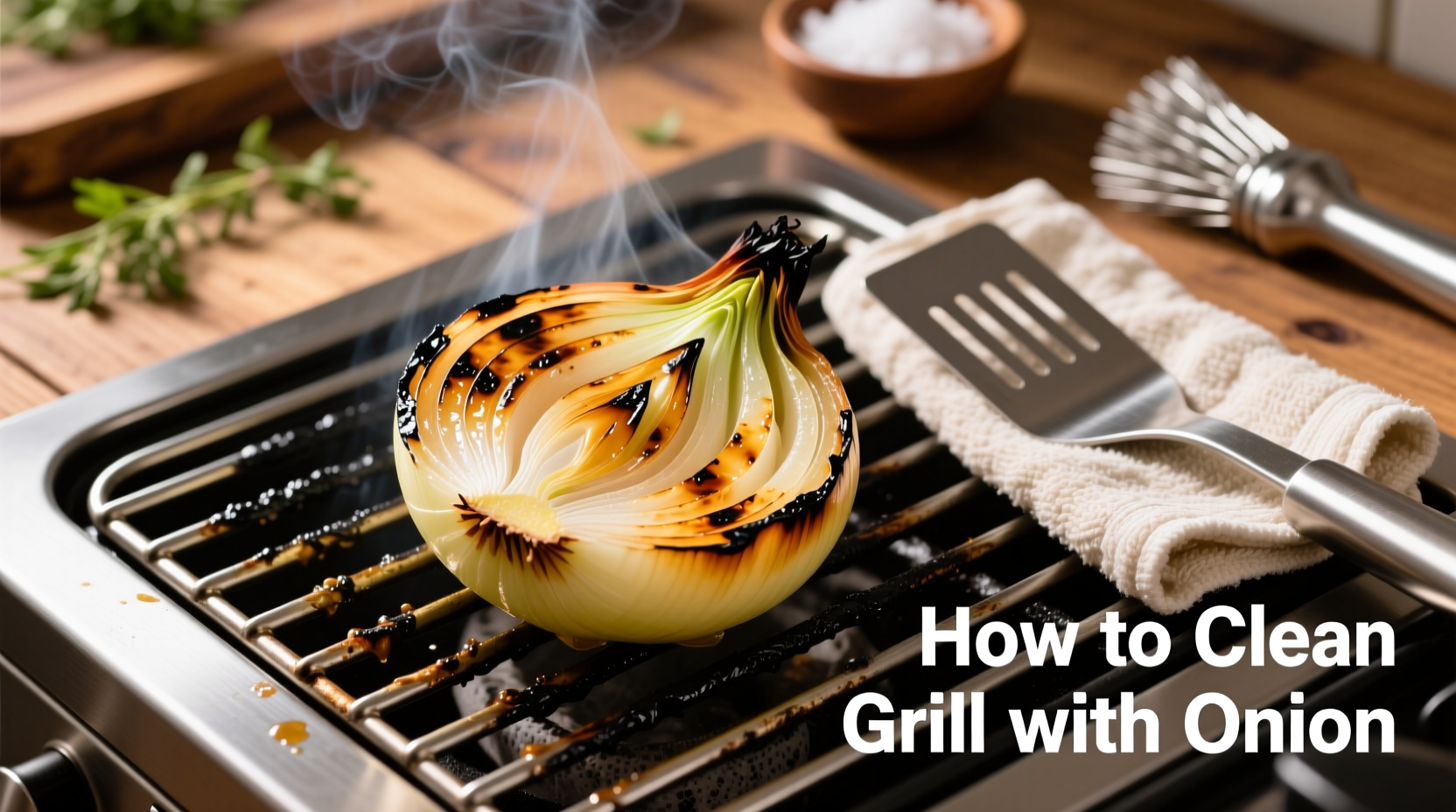Grill cleaning doesn't require harsh chemicals or strenuous scrubbing. The onion method leverages natural acids and fibrous texture to break down carbonized grease and food particles. Professional chefs and grill manufacturers confirm this technique effectively maintains cooking surfaces while avoiding chemical residue that could affect food flavor.
Why Onion Works as a Natural Grill Cleaner
Onions contain natural citric and malic acids that help dissolve grease and carbon deposits. When heated, these compounds become more active while the fibrous layers provide gentle abrasion. According to USDA food safety guidelines, properly cleaned cooking surfaces prevent bacterial growth and ensure safe food preparation. The sulfur compounds released during heating also create a temporary non-stick surface.
| Cleaning Method | Cleaning Time | Residue Left | Safety Rating |
|---|---|---|---|
| Onion Method | 5-7 minutes | Natural oils | Excellent |
| Wire Brush | 8-12 minutes | Brass particles | Good |
| Chemical Cleaners | 15+ minutes | Chemical residue | Fair |
This comparison shows why many professional grill masters prefer the onion technique for routine maintenance between deep cleanings. The method has gained popularity through culinary traditions worldwide, particularly in regions where chemical cleaners were historically unavailable.
What You'll Need
- Fresh onion (yellow or red)
- Grill cleaning tongs or fork
- Heat-resistant gloves
- Damp cloth (for final wipe)
Step-by-Step Cleaning Process
- Preheat your grill to 350-400°F (175-205°C) for 10-15 minutes. Proper heating loosens grease deposits.
- Cut a large onion in half through the root end to maintain structural integrity during cleaning.
- Secure the onion in tongs by piercing the root end—this creates a natural cleaning pad.
- Scrub the grates using firm back-and-forth motions, focusing on areas with visible buildup.
- Rotate the onion as the cut surface becomes dirty, exposing fresh layers for continued cleaning.
- Wipe grates with a damp cloth after cleaning to remove any remaining particles.

When This Method Works Best
The onion cleaning technique is most effective for routine maintenance after each use or when light to moderate buildup occurs. Grill manufacturers like Weber recommend this method for weekly cleaning between deep cleanings. It's particularly suitable for:
- Gas grills with porcelain-coated grates
- Cast iron cooking surfaces
- Stainless steel grates
- Post-cooking residue removal
For heavy carbon buildup or rusted surfaces, combine this method with a deeper cleaning process using a grill stone or specialized cleaner. Never use this technique on cold grates, as the onion won't activate properly and could create sticky residue.
Maintenance Tips for Long-Lasting Grills
After cleaning with onion, apply a light coat of high-smoke point oil like canola or grapeseed to protect the metal surface. This creates a natural seasoning layer that improves non-stick properties over time. The National Fire Protection Association recommends regular grill maintenance to prevent grease fires, which cause over 8,900 home fires annually according to NFPA statistics.
For optimal results, clean your grill while it's still warm (but not scorching hot) after each cooking session. This prevents grease from hardening and makes subsequent cleanings easier. Many professional chefs follow this practice to maintain their restaurant-grade equipment between deep cleanings.
Troubleshooting Common Issues
Excessive smoke during cleaning: This indicates your grill is too hot. Reduce temperature to 350°F and continue. The smoke comes from onion sugars caramelizing.
Stubborn residue remains: For particularly stubborn spots, make a second pass with a fresh onion half. If needed, follow with a brief wire brush treatment on the affected area only.
Onion sticks to grates: Your grill isn't hot enough. Increase temperature to at least 350°F before attempting again. Properly heated grates prevent food (and cleaning tools) from sticking.
Maximizing Your Grill's Lifespan
Regular onion cleaning extends your grill's life by preventing corrosive buildup while maintaining the metal's integrity. Unlike wire brushes that can scratch protective coatings, the onion method cleans without damaging surfaces. The American Grill Association reports that grills receiving regular maintenance last 30-50% longer than those cleaned only occasionally.











 浙公网安备
33010002000092号
浙公网安备
33010002000092号 浙B2-20120091-4
浙B2-20120091-4